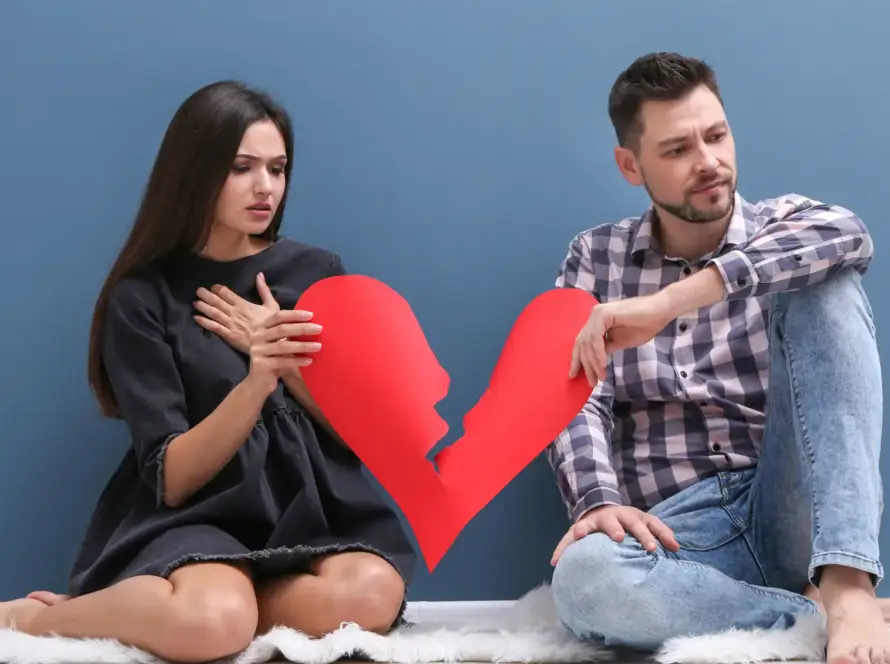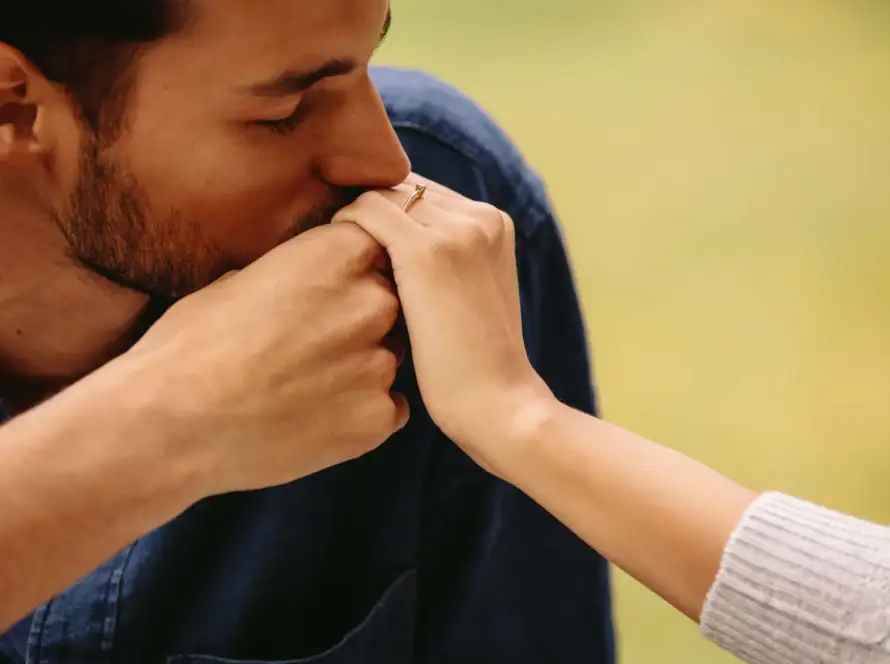Romantic relationships are meant to bring joy, love, and happiness into our lives. But unfortunately, they can also cause deep emotional pain and trauma.
Trauma is defined as a psychological response to a deeply distressing or disturbing experience that can lead to long-lasting effects on mental and physical health.
When it comes to romantic relationships, trauma can stem from past experiences of emotional, physical, or sexual abuse, neglect, betrayal. Or even the loss of a loved one. These experiences can cause significant emotional pain that can be carried forward and impact future relationships.
If we refuse to deal with our past relationship traumas, it won’t matter how many different partners we’ll find in the future. We will have the same experiences in all our future relationships, until we actually brave up and learn our lessons.
Luckily there are more discussions around what trauma is, how to identify it and normalizing healing from trauma. Therefore we get to learn various techniques that we can use to heal ourselves from past trauma.
All this healing will lead us to make better and healthier choices for ourselves and our future relationships.
A few months ago I heard a clip of Sadhguru in which he was talking about trauma. He said that trauma is like manure. We can either stay in it (i.e. relive it regularly and not really do anything about it) and stink, or we can use it as fertilizer for something greater.
It is an unusual way to look at trauma. But the more I thought about it, the more it made sense.
A traumatic event is something that happened to us at a given time. Something that happened and passed.
Trauma is when we are reliving it every time we’re remembering it and we’re suffering because of it.
This doesn’t mean that what happened is not a big or serious event. It just means that we have a choice of taking our lesson out of that episode. And understand and accept that WE are not the trauma. Also to use it to build something greater, instead of allowing ourselves to become plagued with reliving it frequently.
Signs of Romantic Relationship Trauma
The signs of romantic relationship trauma can vary from person to person, but some common symptoms include:
- Fear of Intimacy:
You may struggle to develop deep emotional connections with partners or avoid getting too close to them for fear of being hurt or rejected.
You might find yourself feeling very uncomfortable whenever people try to get closer and open up to you.
Some might see intimacy as a sign of weakness. When in fact it takes strength to truly open up to someone else.
This stems from past experiences where we’ve gotten close to someone and they have hurt us. Or they have rejected us.
One of the most painful experiences is rejection.
In the times when we lived in tribes, being rejected literally meant we would die. In ancient times we needed communities in order to survive.
Therefore the fear of rejection has been passed down from generation to generation as it was crucial for our survival.
The issue today is that, although we don’t depend on a community anymore as we used to, we still have that fear of rejection ingrained in our DNA.
Accepting this and understanding it, helps us work with it. And understand that although we’ve been rejected by our partners. It doesn’t mean we are less than others, or that we’re not worthy, or that we will die without them.
We don’t depend on each other for survival anymore.
- Trust Issues:
You may find it challenging to trust your partner. Even when they have not given you any reason to doubt them.
Always being suspicious of your partner can be quite exhausting and energy-draining.
Trust issues go hand in hand with jealousy. Just because someone had once betrayed you, cheated on you, or lied to you in the past, it doesn’t mean that each partner will do just that. Unless you’re not working on healing from trauma and you keep choosing wrong partners for yourself.
Understanding that whatever a person is doing has a lot more to do with who they are, rather than us, will help us be less overwhelmed by trust issues.
A person who is cheating is doing so mostly because of who they are. Although they might come up with 1001 excuses as to why they have done it. The reality is that many others go through very similar situations and still don’t cheat, or lie.
Once you understand that this has nothing to do with your own worth, you will be free of this energy-draining issue.
They just simply didn’t know how to value you more. And that’s ok. As you’ve learnt your lesson and you can move on and find someone who does.
Trust me! There always are people out there who will value and respect you the way you want it to. You just need to find them!
- Emotional Numbness:
You may find it challenging to express emotions, feel disconnected from your feelings, or have difficulty accessing them.
This too is a self-protecting mechanism. Where once we have felt intense negative emotions because we allowed ourselves to feel and get emotionally involved in a relationship.
And our body is trying to literally protect us from that happening again to us. Hence why it tends to go into ‘self-preservation’ mode and not allow any feelings. As no feelings are safer, for the body, than risking feeling intense negative emotions again.
The issue with this is that it also blocks out positive emotions. Which would make us happier every time we feel them. Whenever we tend not to feel positive emotions either, our ‘happy’ hormones get depleted. And the body will try to counteract that too, by giving you cravings and creating addictions, which are never healthy.
The body is merely trying to keep you alive. And any extremes in emotions and chemical imbalances are not good for the body’s functioning. Hence why it does it’s best to keep you in the normal-ish range.
The body is wired to keep us alive, not necessarily happy.
It is our job to make ourselves happy. We should not expect that from our body alone, nor from anyone else outside of us.
- Low Self-Esteem:
You may struggle with self-worth or feel unworthy of love and attention. Which can lead you to settle for less in your relationships.
This usually comes from the belief that if one person treats us poorly it means that we’re not good enough, or worthy of love.
The vast majority of people who have this belief, have formed it when they were quite young children. Especially if the parents, or their caretakers didn’t pay enough attention to them. And if they felt unseen, unheard, and just disregarded. Hence they’ve formed the belief that ‘if parents are not connecting with me, I must not be worth it’.
Also, there are those who have specifically been told, from a very young age, that they are worthless. Either by their parents, or any adult figure around them.
However we should remember that nobody can treat us poorly unless we allow them to.
If we didn’t really have a choice when we were very young, we do have a choice now.
If we’ve put up with emotional abuse and others making us feel unworthy, it doesn’t mean that we have to continue accepting it.
And even if one person might not see our worth, that doesn’t mean that others won’t see it as well.
We just need to heal from past relationship trauma. And start making better choices when it comes to the people we’re spending time with and our partners.
- Repeating Patterns:
We may keep repeating the same negative patterns even when we know they are bad for a variety of reasons. Including psychological, emotional, and behavioral factors.
One reason is that negative patterns often develop as a way of coping with stress, anxiety, or other difficult emotions. Over time, these patterns can become ingrained and automatic, making them difficult to change. We may continue to engage in these patterns even when we know they are not serving us well. Mainly because they provide a sense of familiarity and comfort, even if they are ultimately harmful.
Another reason we may repeat negative patterns is due to conditioning. We learn behaviors and beliefs from our early childhood experiences. Including our family dynamics and cultural norms, that can shape our behavior in later life. We may not even be aware that we are repeating patterns until we begin to examine our beliefs and behaviors more closely.
Finally, we may also repeat negative patterns due to a lack of awareness or skills to change them. It can be challenging to break free from negative patterns if we do not have the tools, knowledge, or support to do so. For instance, we may not know how to regulate our emotions, communicate effectively, or set healthy boundaries in relationships. Making it difficult to change the patterns that have become so deeply ingrained.
In order to break free from negative patterns, it is important to identify the underlying causes and develop new coping mechanisms and skills. This may involve seeking support from a therapist. Or practicing self-reflection and self-awareness. And also learning new behaviors and habits that are more in line with our values and goals. With time and effort, we can learn to break free from negative patterns and create healthier, more fulfilling lives.
If you identify with any of these signs, it may be an indication that you have experienced romantic relationship trauma.
6 Ways to Deal With relationship Trauma
We all have different experiences when it comes to romantic relationships. Some people may have had positive and fulfilling experiences, while others may have gone through traumatic experiences that left them feeling broken and unable to move on. The latter group may struggle with moving on from the trauma, and this can significantly affect their future relationships.
If you are one of those people, it is crucial to know that there is a way to overcome your trauma and move on to a happier romantic relationship.
Here are 6 ways to deal with romantic relationship trauma:
- Seek professional help:
One of the most effective ways to deal with romantic relationship trauma is to seek professional help from a therapist or counselor.
A trained professional can help you identify and process the emotions associated with the trauma. And provide you with the necessary tools to heal and move forward.
They can also help you identify patterns in your relationships. And work towards changing any negative behavior that may be contributing to your trauma, by giving you the exact step you should take.
- Practice Self-Care:
Self-care is an important part of healing from relationship trauma. Taking care of yourself physically, emotionally, and mentally can help you feel better and more equipped to handle the challenges of healing.
This can include getting enough sleep, eating a healthy diet, exercising regularly, spending time with friends and family, and engaging in activities that bring you joy.
- Set Boundaries:
Setting boundaries is crucial for healing from romantic relationship trauma.
Boundaries are limits that you set for yourself and others to protect your emotional and physical well-being.
It’s important to communicate your boundaries clearly and assertively with your partner or anyone else involved in the situation. This can help you feel more in control and less vulnerable to further trauma.
- Practice Forgiveness:
Forgiving someone can be a difficult but powerful tool for healing from relationship trauma.
Forgiveness doesn’t mean forgetting or condoning what happened, but it can help you release negative emotions and move on.
Pardoning can also help you regain trust in others and open yourself up to new, healthy relationships.
- Take Time for Yourself:
Taking time for yourself is essential for healing from romantic relationship trauma.
It’s important to take a break from dating and focus on your own needs and healing.
This can help you rediscover yourself and what you want in a future relationship. It can also help you build self-esteem and self-confidence, which can be essential for building healthy relationships in the future.
- Relationship Healing Meditation:
Relationship healing meditation can help heal from relationship trauma. It provides a safe and supportive space for individuals to process their emotions and experiences related to the trauma.
Traumatic experiences can leave lasting emotional wounds, and relationship healing meditation can help individuals address and work through those wounds.
During relationship healing meditation, individuals may focus on cultivating self-awareness and self-compassion. As well as developing a sense of inner calm and peace. This can help them to regulate their emotions and reduce symptoms of anxiety, depression, and post-traumatic stress disorder (PTSD).
Meditation can also help individuals gain perspective on their relationship trauma and see it in a new light. It can help them develop a sense of forgiveness and compassion towards themselves and their former partners. In addition, it can help individuals improve their ability to communicate and form healthy relationships in the future.
Ultimately, relationship healing meditation can provide a powerful tool for individuals seeking to heal from relationship trauma by promoting self-awareness, self-compassion, emotional regulation, and forgiveness.
If you are interested in such a meditation that can help heal your past relationships and get you ready for a new amazing one, make sure to check out our Products page where you can get a 25 min very powerful Relationship Healing Meditation by LA’s #1 psychic, Jusstinee Kaye!
Whichever option you’re choosing to deal with trauma of past relationships, make sure it is something you feel comfortable with.
Some more issues might arise from doing this work, but at least you get to start with a ‘clean slate’.
If you decide to not go through with healing past trauma from your life, you will end up re-living the same situations and meeting similar people until you finally learn your lesson and move on to higher vibrations and happier relationships.
Hence why, today more than ever, it is more important to face our demons, one by one and deal with our past trauma so that we can be free of it and live amazing lives.
Let me know what you think about this article and if you would like to read about anything else in particular.
Email me at diana@bettertopics.com
I would love to hear from you!











